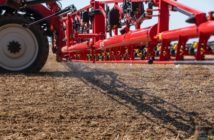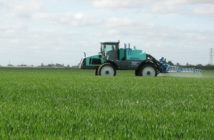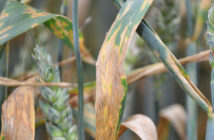Winter oilseed rape is still the most widely grown break crop in the UK, but some growers have abandoned this crop as yields have been variable and input costs regarded as high. Nevertheless it is still the third most widely grown crop. The obvious break crop to take its place is winter beans and the negative view on rape plus the Three Crop ruling is seeing an expansion of this crop. DEFRA estimate that there was a 5% increase in the bean area up to 178,000 hectares of beans grown in 2016.
“Winter beans are an obvious substitute for winter rape, suiting heavier ground and being the classic pulse crop for heavy land. Pulses have a positive effect on a farm rotation, providing a benefit to subsequent crops such as wheat and rape. Beans require no nitrogen fertiliser. Although beans don’t need a fine seedbed for drilling, if you are using a pre-em herbicide mix you do need to try to create a good seedbed. An important bonus of winter beans is that farmers can use herbicides which are not recommended in cereals, such as Kerb Flo 500 (propyzamide), enabling the most effective use of a true break crop in a combinable crop rotation,” says Peter Waite of Dow AgroSciences.
“Nowadays weed control practices have a stronger rotational element to them, with growers not thinking just about a single crop any longer. Winter beans offer a great opportunity to control grass-weeds with different chemistry, thereby helping to minimise further resistance as well as reducing the weed burden across the farm,” says Peter.
He reports that independent trials in winter beans have demonstrated that Kerb 500 Flo, applied pre-emergence in mixtures or in sequences, gave the highest levels of black-grass control. “It can be mixed with a range of other herbicides approved in winter beans including clomazone, pendimethalin + imazamox, (Nirvana) and under Extension of Authorisation of Minor Use (EAMU’s) prosulfocarb or pendamethalin (Stomp Aqua, Cinder). Most common weeds in this crop can be controlled with these chemicals,” he says.
Peter advises that winter beans should not be drilled any earlier than mid-October as forward crops are susceptible to disease and severe winter weather. “Drilling beans from mid-October through to mid-November allows stale seedbeds with glyphosate to reduce difficult grass-weed populations. Once again this fits in with the principle of cross crop control of black-grass, where cultural control goes hand in hand with chemical control. Winter beans are not very competitive early on and a pre-emergence herbicide removes weeds and encourages branching of the bean plant.”
Peter points out that there is no confirmed weed resistance to Kerb Flo 500 and so it is useful to help clean up key weeds such as black-grass, rye-grass, meadow-grass and wild-oats across the rotation. “Propyzamide belongs to the benzamide family of chemicals, a subset of the group K1 (HRAC), and has a complex mode of action. Kerb works by inhibiting the assembly of microtubules, thus preventing normal cell division. The risk of resistance developing to propyzamide is considered to be low due to this complex mode of action.”
“With widespread black-grass resistance to ALS and ACCase herbicides, winter beans have become a true break crop. Kerb has been used in the UK widely since the 1970’s yet there is no weed resistance. Dow AgroSciences test for resistance each year and there has been no shift in sensitivity. Applied at 1.7 l/ha, Kerb Flo 500 has a label recommendation for all varieties of winter beans on medium and heavy soils. It is applied within 7 days of drilling and before crop emergence,” he says.
Note that ASTROKerb does not have a recommendation for beans and Kerb cannot be used in spring beans.




